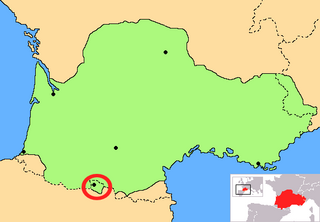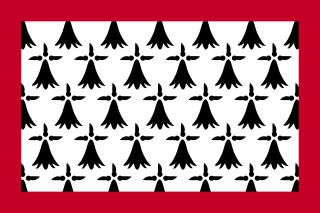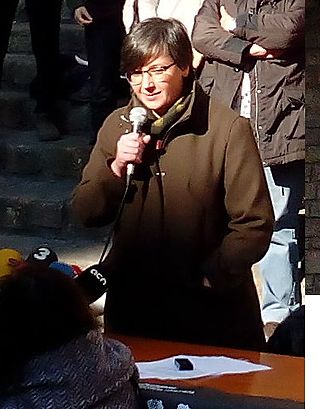
Occitan, also known as lenga d'òc by its native speakers, and sometimes also referred to as Provençal, is a Romance language spoken in Southern France, Monaco, Italy's Occitan Valleys, as well as Val d'Aran in Catalonia; collectively, these regions are sometimes referred to as Occitània. It is also spoken in Calabria in a linguistic enclave of Cosenza area. Some include Catalan in Occitan, as the distance between this language and some Occitan dialects is similar to the distance between different Occitan dialects. Catalan was considered a dialect of Occitan until the end of the 19th century and still today remains its closest relative.

Aran is an administrative entity in Lleida, Catalonia, Spain, consisting of the Aran Valley, 620.47 square kilometres (239.56 sq mi) in area, in the Pyrenees mountains, in the northwestern part of the province of Lleida.

Gascon is the name of the vernacular Romance variety spoken mainly in the region of Gascony, France. It is often considered a variety of Occitan, although some authors consider it a different language.

Aranese is a standardized form of the Pyrenean Gascon variety of the Occitan language spoken in the Val d'Aran, in northwestern Catalonia close to the Spanish border with France, where it is one of the three official languages beside Catalan and Spanish. In 2010, it was declared the third official language in Catalonia by the Parliament of Catalonia.

Occitania is the historical region in Western and Southern Europe where the Occitan language was historically spoken and where it is occasionally used as a second language. This cultural area roughly encompasses much of the southern third of France as well as part of Spain, Monaco, and parts of Italy.

Limousin is a former administrative region of southwest-central France. On 1 January 2016, it became part of the new administrative region of Nouvelle-Aquitaine. It comprised three departments: Corrèze, Creuse, and Haute-Vienne.

Se Canta is an anthem associated with Occitania. It is also a very old popular song, known all over Occitania. According to legend, it was written by Gaston III Fébus (1331–1391), Count of Foix and Béarn.

Naut Aran is a municipality in the comarca of the Val d'Aran in Catalonia, Spain. It is the second largest municipality in Catalonia in terms of surface area, and was created in 1967 by the merger of the municipalities of Arties, Salardú, Gessa, Tredòs and Bagergue: the former municipalities retain some privileges as "decentralised municipal entities". The name literally means "Upper Valley" in Aranese, and both the Garonne (Garona) and the Noguera Pallaresa have their sources on the territory of the municipality. The town hall is in Salardú. The municipality is linked to Vielha by the C-28 road, which continues to Alt Àneu over the Port de la Bonaigua (2072 m). This road, the higher stretches of which are impassable in winter, was the only route between the Aran Valley and the rest of Spain before the opening of the Vielha tunnel in 1948.

The Occitan cross is a heraldic cross, today chiefly used as a symbol of Occitania.

Saint-Orens-de-Gameville, also referred to as Saint-Orens, is a commune in the Haute-Garonne department, administrative region of Occitania, southwestern France.

Occitan cuisine is the traditional cuisine and gastronomy of Occitania, the supranational region where Occitan is traditionally spoken.
Occitan Republican Left is an Occitanist political party in Val d'Aran comarca of Catalonia, Spain. Founded in 2008 to contest Unity of Aran and Aranese Democratic Convergence at 2011 elections for the Aranese General Council, the party acts practically as the local section of the Republican Left of Catalonia and is chaired by Jusèp Loís Sans Socasau.

Occitan nationalism is a social and political movement in Occitania. Nationalists seek self-determination, greater autonomy or the creation of a sovereign state of Occitania. The basis of nationalism is linguistic and cultural although currently the Occitan varieties are minority languages within the language area.

Occitania is the southernmost administrative region of metropolitan France excluding Corsica, created on 1 January 2016 from the former regions of Languedoc-Roussillon and Midi-Pyrénées. The Council of State approved Occitania as the new name of the region on 28 September 2016, coming into effect on 30 September 2016.
Corròp is a political party in the Val d'Aran founded in 2015. The party defends Occitan and Aranese self-determination, socialism in an anticapitalist sense, direct democracy and ecologism. Corròp also supports an autonomous Aran Valley in an independent Catalonia as the best short-term solution to the Aranese issue and the Catalan independence debate in the valley, considering that the independence of Catalonia is good for both Aran and the whole Occitania.

The Partit Nacionalista Occitan, more simply, "PNO" is a political party of Occitania, founded in 1959 by François Fontan (1929–1979). The current name is "Partit de la Nacion Occitana".

Mireia Boya Busquet is a Catalan scientist, activist, and politician from Spain. She is a councilor of the Aran municipality of Les. Since February 2018 she has been part of the national secretariat of the Popular Unity Candidacy (CUP). She was a member of the Catalan Parliament from 2016 to 2017.
Maria Pilar Busquets i Medan was a Spanish Aranese politician and writer, 1st Síndic d'Aran between 1991 and 1993.

The Síndic d'Aran is the head of government of the Val d'Aran, an autonomously governed region within the Province of Lleida of Catalonia, Spain. The Síndic leads the thirteen-member Conselh Generau d'Aran, the governing body of the region. The office of Síndic d'Aran and the larger autonomous government were created in June 1991.

The 2007 Aranese Council Election, was held on Sunday, 27 May 2007, to elect the General Council of Aran, an administrative entity in the province of Lleida (Spain). All 13 seats in the council were up for election. The election was held simultaneously with regional elections in twelve autonomous communities and local elections all throughout Spain.

















